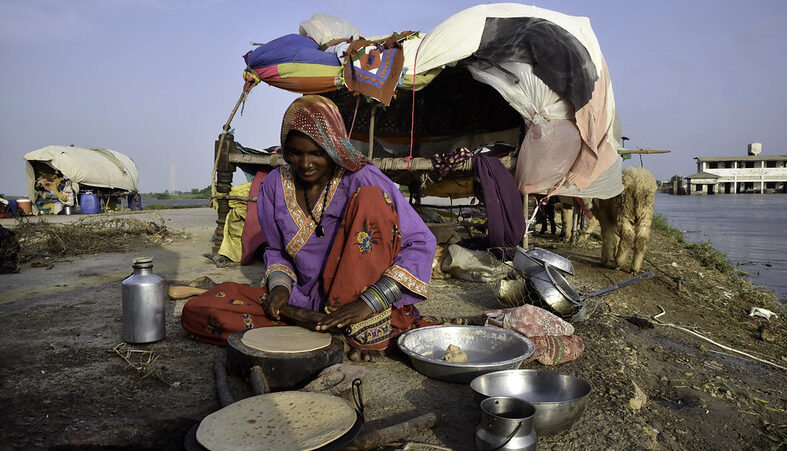Six months on from the start of devastating floods in Pakistan, about 200,000 people are still displaced – living under tarpaulins by the side of the road.
As summer turned to winter, some parts of the country have seen snow. “For children and old age people without shelter, it’s terrible,” said Concern Worldwide’s Sherzada Khan.
Young women and girls are still “forced to live without roof and walls,” he added, putting them at risk of sexual assault.
On top of this, he said “[a] severe food security crisis [is] looming now and will be there until the next harvest”.

People affected by the flood queue up for relief items (Pic: Abdul Majeed/EU civil protection and humanitarian aid)
With stagnant flood water still around in some places, malaria is rife at the time of year it should be minimal, according to Ed Taylor from Médecins Sans Frontières.
Taylor and his colleagues are giving out bed nets to vulnerable people to keep the mosquitos out. But, he says, this needs to be done on a bigger scale by the UN.
“We haven’t scaled up nearly enough to meet the size of the challenge,” he said.
Asif Sherazi, head of Islamic Relief Pakistan, agreed. “Humanitarians have failed in this disaster”, he told Climate Home.
Several relief workers involved in the response to the floods said this failure was partly because the cash-strapped UN cut back its humanitarian team in Pakistan just before the floods hit.
Ocha’s budget cuts
The UN’s Office for the Coordination of Humanitarian Affairs (Ocha) has headquarters in Geneva and New York and staff in 60 countries, mostly in low and middle income countries.

Ocha has staff in 60 countries, mostly in the global south
When disaster strikes – through storms, earthquakes, war or disease – its job is to raise money from around the world and coordinate an international relief effort.
This job has been getting harder, as climate change kicks in. The number of climate-related disasters like floods and storms in the 2010s was double what it was in the 1980s.

Climate-related disasters doubled in the 2010s compared to the 1980s (Photo: Ocha/Screenshot)
While needs have soared, the amount of money Ocha gets from wealthy governments – about 95% of its total income – has stagnated. In 2015, it got $334 million. By 2020, this had dropped to $307m.
Since 2020, as the Covid-19 pandemic and energy inflation took an economic toll, several rich countries tightened their belts further.
As Ocha’s budget fell, so did its staff numbers. The organisation employed 2,300 people in 2015 and now employs 2,000.
Ocha in Pakistan
Pakistan was not spared from these cutbacks. At the end of 2021, Ocha downgraded its presence from a full "country office" to a "humanitarian advisory team" reporting to Ocha's regional office in Bangkok, Thailand.
That meant its team in Islamabad didn't produce a humanitarian response plan for 2022, as they had for the years before.
In 2016, Ocha had around 35 staff in Pakistan and a budget of more than $5m. By 2021, its budget was $1.1m and in 2022 it employed seven people.

In September 2022, large parts of the country were covered with water - not all of these flood waters have yet receded (Photo: Abdul Majeed/EU civil protection and humanitarian aid)
So when flooding started in July 2022, it had a netball team's worth of people in the country to survey the damage. Ocha sent staff over from Bangkok and elsewhere, upping the headcount to 25-30 people by the end of the year.
But Abid Suleri, who sits on the board of directors of Pakistan's National Disaster Risk Management Fund, told Climate Home that cuts to Ocha in Pakistan "did have an impact" on its response.
Anam Zeb, who worked at the National Disaster Risk Management Fund when the floods hit, said Ocha was "not as visible as it was before", particularly in carrying out needs assessments.
Another humanitarian, who works with Ocha and so did not want to be named, said: "Ocha did not have the presence in Pakistan to co-ordinate everything." They added that they did not have the right "speed and scale".
Fundraising failures
In particular, they said Ocha did not do enough to raise funds. "For funding, you need to do some extra efforts," they said, " you use your media contacts, you use your other contacts."
Floods started in July and intensified in August. Ocha put out an appeal on 30 August for $160 million. That was quickly met by foreign governments - but fell well short of what survivors needed.
A spokesperson for Ocha said it was put together just six days after flooding escalated and "was therefore produced using a preliminary understanding of the situation".
On 19 September, Ocha upped this appeal to $820 million. “We need all of these funds, and we need them quickly,” said the UN's humanitarian coordinator for Pakistan Julien Harneis.
But the world's media quickly moved on and governments lost interest. UN data suggests $262 million has been promised so far and less has actually reached the ground.
Charities have responded by rationing essential supplies. A UN report found that NGOs were having to hand out just one tarpaulin for each household to shelter from the sun and rain rather than the usual two.
Where Ocha goes next
At the start of the year, Ocha upgraded its presence in Pakistan back to a full country office. But, with a limited budget, that will mean cutbacks elsewhere.
Ocha's office in the Philippines, for example, was downgraded at the same time as Pakistan's. That's despite Ocha's 2020 annual report describing the south-east Asian nation as "one of the world's most natural-hazard prone countries".
A spokesperson for Ocha said it "continues to enhance the coordination and effective and efficient delivery of humanitarian assistance, together with humanitarian organisations".
"To implement its mandate, Ocha relies heavily on voluntary contributions, mostly from governments," the spokesperson added.
